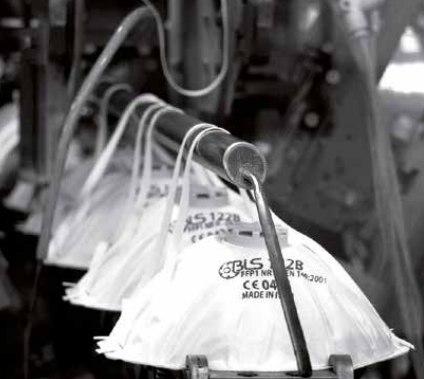March 16, 2020 Press Release SME manufacturers of protective equipment are a crucial asset in Europe's fight against the Coronavirus
SME Safety, 16 March 2020. As the Coronavirus hits Europe hard, the public demand for face masks is unprecedented. Worldwide production of masks and other protective equipment cannot meet the requirements of hospitals and clinics, which are struggling to keep their personnel safe. The European Commission is now turning to the continent’s producers of protective equipment, many of which are SMEs, to strategize about how to deal with the situation at hand. As it turns out, there are several smart solutions to not only increase production, but find better and more sustainable ways to use protective equipment.
Increasing production capacity of European producers
The crisis is triggering different responses by national governments in Europe and beyond. France is currently claiming supplies of protective masks. In the past, during the SARS epidemic crisis in France (early 2000s) and the national defence vulnerabilities in Israel, both states have introduced financial measures to help their national manufacturers meet the market demand for respiratory protective devices. Earlier this week, the European Commission called an emergency meeting with European producers. Commissioners Breton and Kyriakides’ proposed actions include a joint procurement plan to supply 20 participating member states with protective equipment. While it is currently unclear what exact measures this joint procurement plan would entail, SME Safety calls for European direct investments to expand the production lines of Safety equipment’s manufacturers.
Increasing production and usage of reusable filtering masks
There are big differences in types of masks and their respective uses. Disposable surgical masks are most commonly seen in public and on the media. These masks are unfit to filter the virus, so they are not as effective protection against COVID-19 as the FFP2/3 filtering masks. In fact, they are designed to protect patients from being contaminated by health workers during surgeries. Disposable filtering masks classified as FFP2 and FFP3 are instead a good option for citizens and health care workers to protect themselves. Filtering half masks are a better option. At this crucial point in time, Europe must increase the production and usage of the appropriate type of face masks, and many SME producers are ready and willing to step up to the task. Another type of masks that is effective against the virus, but is not yet under excessive demand, is the reusable half masks coupled with filters classified P2 and P3. Such combination offers the same filtering efficiency as FFP2 and FFP3 masks, while having the additional benefit of being reusable, provided the filter pieces are exchanged once a month. Read more about the different types of face masks here.
SME Safety calls on EU Institutions to act rapidly and fund safety equipment producers
As an organisation with some of the biggest producers of face masks in Europe, SME Safety calls on European lawmakers to take decisive action now. A first crisis meeting of Commissioner Breton with safety equipment producers, among them SME Safety President PierPaolo Zani, yielded first viable commitments. But time is of the essence. To ensure continuous protection of health workers and the public, the capacities of European producers must be increased with European funding now. Europe must also learn from this catastrophic situation. Safety equipment producers are an indispensable strategic asset for Europe in the volatile future we are facing. Pandemics, wildfires, flooding; Europe must be prepared. When push comes to shove, we must stand together as one continent and rely on our European safety equipment producers. |
News
| SBS Webinar - Smart Textiles Standardisation Monday, November 21, 2022 |
| SBS Forum 2022 on PPE and Textile Care: Standardisation in the PPE sector – From dual to multi compliance Wednesday, October 19, 2022 |
| SBS Forum on PPE and Textile Care 2021 Monday, October 04, 2021 |
